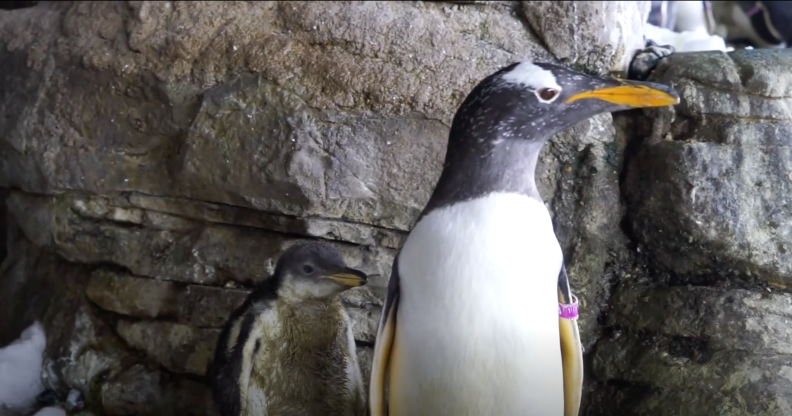Adorable lesbian penguin couple welcome their first baby chick

One half of the penguin couple and their chick. (Screen capture via UniLad/Newsflash)
In today’s brief break from the thumping drumbeat of dreary news, a gay penguin couple have welcomed their first baby and it’s every known kind of adorable.
Penguin parents Electra and Viola will no doubt ruffle a few homophobe’s feathers as they rear an adopted chick at the Oceanogràfic Aquarium in Valencia, Spain.
The pair adopted the egg from another penguin couple and incubated it themselves and are one of three chicks to have been born into the colony of 25 gentoo penguins this breeding season.
Navi and Aquela, as well as Bolo and Melibe, also welcomed new fluffy additions to their households.
But for anybody reading this who finds it fishy why we haven’t mentioned the chick’s name yet, zookeepers are holding off on naming the baby as they wait to conduct blood tests when they’re six-weeks-old to determine their gender, according to UniLad.
Gay penguin couple Electra and Viola welcome their new chick.
Electra and Viola, who really sound like they should be fleeing from the police in a car and drive off a cliff into the Grand Canyon, are a pretty cool couple, according to their handlers.
The aquarium’s bird-keeper Carlos Barros explained that staffers noticed that the penguins were showing common breeding behaviour and built nests using stones together.
Stones are also commonly used by the birds in mating rituals (being a lot cheaper than flowers and a movie) and are typically given to females by males.
So, zoo-keepers decided to give them an egg to raise together.
“They put two eggs each inside obviously without knowing they were not fertile,” Barros said, “so we put one of the eggs from a different couple into their nest so that they could take care of it.”
Electra and Viola certainly aren’t the only gay penguin couple to waddle onto the scene, with Australia’s Sphen and Magic and Germany’s Skip and Ping also drawing headlines.
Same-sex behaviour has been seen in more than 1,500 animal species, scientists say, a fact that has confused evolutionary biologists as it appears not to have evolutionary benefits.
This “Darwinian paradox” has often posed the question of why this behaviour evolves and persists even if it doesn’t aid reproduction. But researchers say this is asking the wrong question.
Instead, scientists should flip the underlying, often homophobic assumptions of a whole wing of biology and look to “relaxing traditional constraints on evolutionary theory,” said a lead author of an article that suggests bisexual mating habits are the “original condition” for all animals that have sex.

